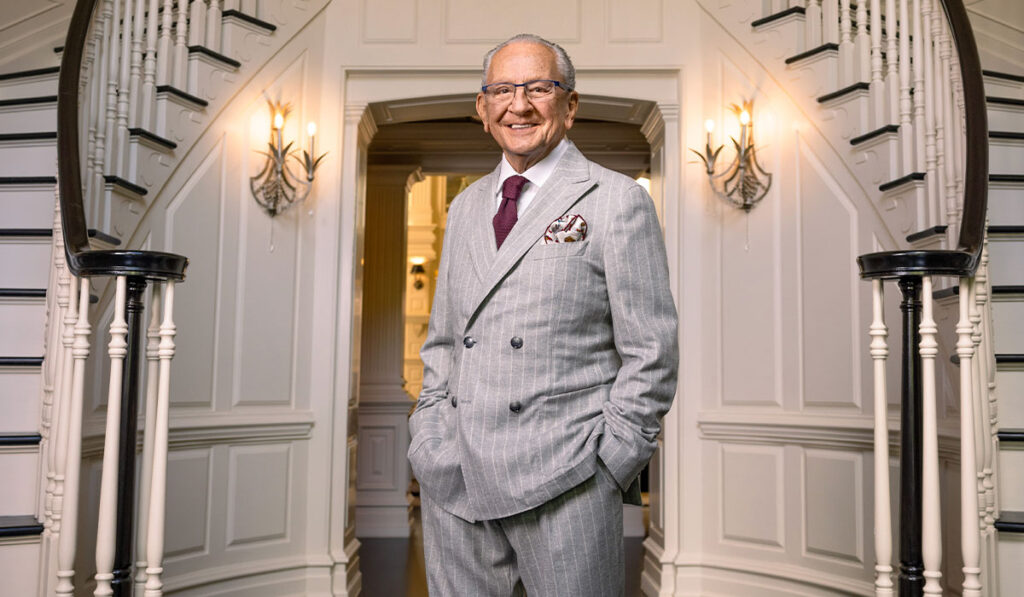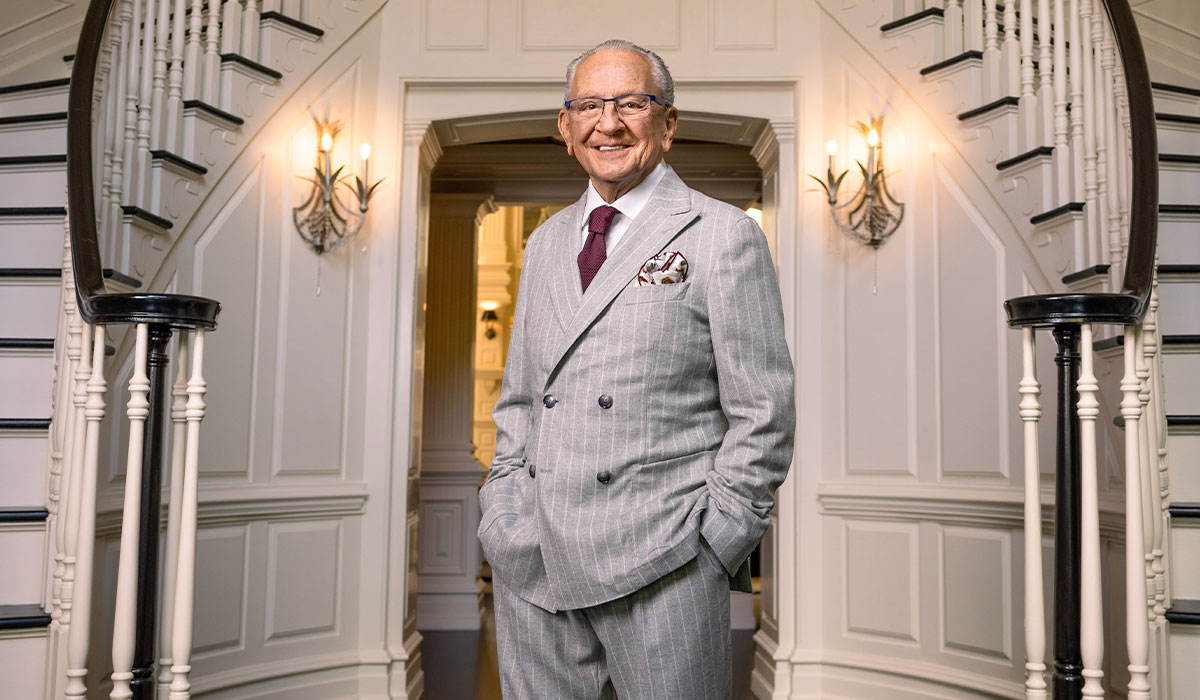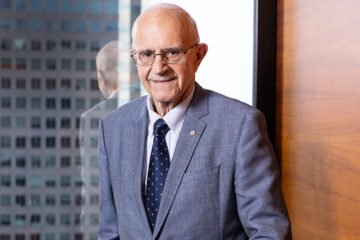Frank Caprio: The Honourable Judge Of Character

From a small municipal court in Rhode Island to an online sensation as the ‘nicest judge in the world,’ judge Frank Caprio looks back on a most wonderful life.
If you were born in the middle of the Great Depression to poor Italian immigrant parents and your father had had only a seventh- grade education and worked as a fruit peddler and a milkman and you worked in your youth as a dishwasher and a shoe-shiner, you might be excused if you thought life had dealt you a bad hand, that you were at a disadvantage and behind the eight-ball from the very beginning, with success an elusive goal. You might even hold a grudge and use that difficult upbringing as some sort of excuse for not fulfilling your potential. Early adversity can sometimes have a lifelong and devastating effect on people.
That’s not the way that Frank Caprio, one of the United States’s most successful and respected magistrates and politicians, former Chief Judge of the Municipal Court of Providence, Rhode Island, star of his own television show and of viral videos attracting more than 10 billion views, looks back on the circumstances of his challenging childhood. According to Caprio, now retired and 88 years young, his childhood was a “privilege.”
“I’ve always maintained I had a very privileged childhood because I was born into a poor family,” says Caprio, in a recent interview with Dolce. “My dad immigrated here from Italy. He was one of 10. My mother, who was the first born in America to Italian immigrants, she was one of nine. We had very little in material possessions when I was a child — they were almost nonexistent — but we had a love and bonding of our family that was just beautiful. My dad always worked menial jobs in a low position. We lived in what was called a ‘cold- water flat,’ meaning we didn’t have hot running water. But we had the love and respect of the family unit, which kept us together and kept us warm. We really didn’t need very thick blankets.”
Character is revealed through words. Honesty is revealed through words. Compassion is revealed through words. Honour is revealed through words. Life is revealed through words. And Frank Caprio has led a life of character, honesty, compassion and honour.
“I led a life understanding that I had 20 aunts and uncles, and they all lived within two miles of where we lived, and we were one complete family,” continues Caprio. “So, we had a very close-knit family and a family unit that was very, very important to us and shaped our life. The experiences I had as a child have really fortified my life — to learn to overcome adversity, to accept it, to challenge it, to understand what love means, to understand what devotion to family means, to understand what commitment means and to understand what togetherness means. Every weekend we got together. These are not lessons taught in a book — they are learned at this table. In the winter it would be so cold that we had a pot-bellied stove that provided the heat for the entire apartment, and my dad would leave the oven door open, and we would sit in front of that pot-bellied stove, and he would talk about life to my brothers and to myself. That shaped me. My hardship drove me to my achievement.”
Caprio was born in the Italian-American neighbourhood of Federal Hill in Providence, Rhode Island, the second of three sons of Antonio Caprio, an Italian immigrant from Teano, Italy, and Filomena Caprio, an Italian-American mother from Providence whose family had immigrated from Naples, Italy.
After attending Providence public schools, Caprio graduated with a bachelor’s degree from Providence College and began teaching American government at Hope High School in that city. Not being able to afford law school, Caprio would teach during the day in Providence and then drive the 50 miles to Boston where he attended night school at the Suffolk University School of Law. That led him to joining the legal profession, but he also served in the Rhode Island Army National Guard from 1954 to 1962.
“I’ve Always Maintained I Had A Very Privileged Childhood Because I Was Born Into A Poor Family.”
“Education is the key to success in life, to a good life, to a prosperous life, to an understanding life, which gives you an opportunity to help not only yourself and your family, but to help the world,” said Caprio, looking back at his considerable time in school. “My dad would wake us up at 4:00 in the morning and take my brothers and me to work with him on his milk truck, and he would say to us, ‘If you don’t want to do this the rest of your life, you’ve got to stay in school,’ and those words resonated with me to this day, and changed my life. Without education, I don’t know where I’d be today.”
His father’s work as a milkman provides further insight into the Caprio family and what shaped Frank Caprio’s character. The milk company’s rule was that if any family had not paid their milk bill for two weeks, the milkmen were to stop delivering milk to that family. “My dad had his own rules,” laughs Caprio. “If that family had children he would continue delivering milk, and oftentimes paid a little bit of the milk bill out of his own pocket and would simply tell his bosses the family was making arrangements to pay. He may not have had the money, but he never stopped delivering the milk, especially if they had children. He always impressed upon us the importance of family and children. My entire life has been a reflection of my upbringing.” In the movie of the Caprio family, it’s hard to decide whether Jimmy Stewart plays Frank Caprio or his father Antonio.
“Education Is The Key To Success In Life, To A Good Life, To A Prosperous Life.”
Emboldened and formed by his education, Caprio’s interest in government led to his election to the Providence City Council, where he served from 1962 to 1968. He was elected as a delegate to the Rhode Island Constitutional Convention in 1975 and has been elected as a delegate to five Democratic National Conventions. In 1985, he began to serve as a judge on the Providence Municipal Court, on which he had a long and distinguished career until his retirement in January 2023.
As history has shown us, celebrity can have very humble beginnings, and the story of Judge Frank Caprio, simply doing his job in a relatively small Rhode Island municipal court and dealing with low-level citations, is yet another example.
Judges often get a bad rap, and it’s been that way for generations. From the “hanging judges” of the Old West to movies, TV shows and the more- recent personality-centred syndicated courtroom TV reality series focusing on the tawdry and the truly bizarre, judges are usually portrayed as dour, sour and humourless individuals.
This is particularly evident in film, often the only way most of the general public’s perceptions of the judicial profession are shaped. Usually the camera is lower than the judge’s high bench, pointing up and producing the visual image of the unsmiling judge literally looking down on the people before him or her.
A small cable-access channel in Rhode Island, which no doubt went off the air at midnight with the national anthem playing, began to show Judge Caprio’s in-courtroom proceedings on a show called Caught in Providence. Broadcast regulations stipulated that every local cable channel needed a percentage of its programming to be local content, and Judge Caprio’s courtroom fit the bill nicely and was cheap to produce, a major consideration. The show was then picked up by the local ABC station in 2000, and, even though it aired late on a Saturday night, it began to build an audience, mainly because Judge Caprio was the very opposite of magistrate-as-curmudgeon.
In fact, Judge Caprio shattered that somewhat unfair and manufactured reputation completely. The courtroom is one of the most serious places in our society, but his demeanour on the bench was always reasonable, approachable, understanding and considerate to all sides and all points of view. Judge Caprio’s unconventional style and human interactions caught on. The judge as a human being — who knew?
In 2018, Caught in Providence went into American syndication and clips from the show went viral, garnering more than 10 billion views and earning him the nickname of “the nicest judge in the world.” Judge Caprio was a worldwide star and recognized when he walked the streets of Italy, France and elsewhere. (His distinctive style can be seen on Instagram videos at @therealfrankcaprio).
“The Experiences I Had As A Child Have Really Fortified My Life.”
The fame he gained through social media gave Judge Caprio another cause for reflection and perception. “Because of social media, the world has become so small,” he observes. “The one thing that astounds me are the comments I’ve received about treating others with understanding and compassion. I get thousands of messages and 98 per cent of those are saying, ‘We appreciate how you treat people with compassion and understanding.’ There seems to be a lack of that in the world. It seems we are so detached and self- centred. I was brought up in a family where you’d go out of your way to help others.”
At his alma mater, Suffolk University Law School, Judge Caprio founded the Antonio Caprio Scholarship Fund, named to honour his late father. The fund is for Rhode Island students committed to improving access to legal services in the state’s urban-core neighbourhoods. He has also been involved with the Boys Town of Italy, which helps at-risk youth and children, the Rhode Island Food Bank, and was awarded an honourary Doctorate of Law by Suffolk Law School in 1991 and an Honorary Doctorate from Providence College in 2008, and an Honorary Doctorate degree from the University of Rhode Island in 2016.
He retired from the Court in 2023, is still practicing law, and in February of 2025 will be releasing his first book, Compassion in the Court: Life-Changing Stories from America’s Nicest Judge. In December of 2023, he announced he had been diagnosed with pancreatic cancer, and then in May 2024 that he had finished his cancer treatment.
After he finished sixth grade, the young Caprio was going to go to a new school and the students were given an autograph book to collect signatures and names as keepsakes. Caprio asked his father to sign his, and his father wrote, “The road is long, the street is wide, but I know you will proceed honorably, with your head held high, on that rocky road.”
Frank Caprio has traversed that rocky road well in travelling from being a dishwasher to a titan of American law, and from being a shoe-shine boy with no hot water or heat at home yet warmed by the love and strength of his close Italian family and guided by his deep love and respect for religion. Rising to the pinnacle of the judicial system, born in the Great Depression and emerging as an unlikely online sensation 80 years later, Frank Caprio is proof …
Proof that your childhood surroundings, even if meagre and challenging, don’t defeat you but can make you stronger. Proof of the power of family in shaping you. And proof that a life of honour, compassion, love and kindness can deliver everything you could ask for and more — most importantly, deliver a life well lived. The world needs more people like Frank Caprio.
Editor-in-chief: Michelle Zerillo-sosa | Photographer: Jesse Milns | Videographer: Lismery Loyola | Wardrobe Stylist: Karyssa Paez | Creative Director: Fernando Zerillo | Mood Board: Massimo Sosa





























































































